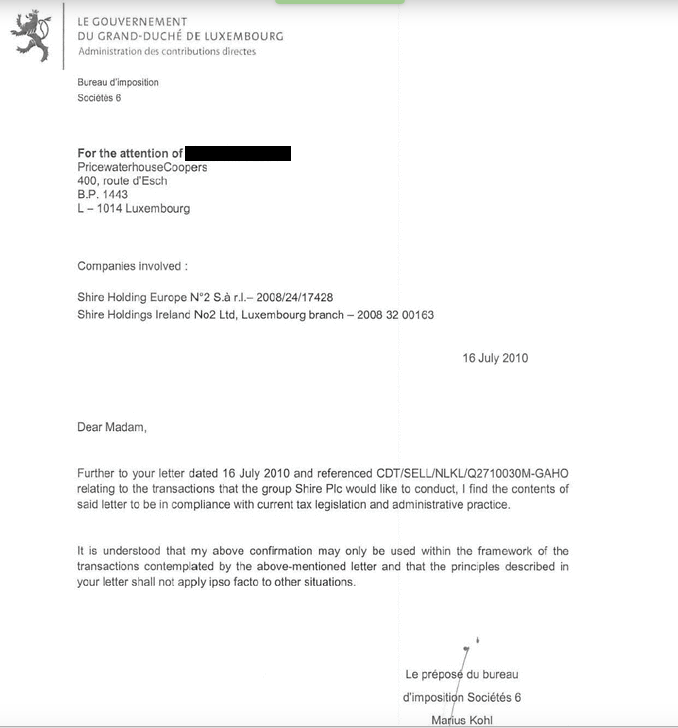|
Tax Exporting
Tax exporting occurs when a country (or other jurisdiction) shifts its tax burden (partially) abroad. For example, if residents of country A hold shares of a company in country B, the government in B might want to levy an inefficiently high tax on this company's profits since the tax is partially borne by the shareholders in A. Tax exporting does not necessarily involve direct taxation of foreign residents. It can also work through other economic channels, such as price changes. See also * Capital flight * Capital strike * Luxembourg leaks * Tax avoidance * Tax competition * Tax inversion A tax inversion or corporate tax inversion is a form of tax avoidance where a corporation restructures so that the current parent is replaced by a foreign parent, and the original parent company becomes a subsidiary of the foreign parent, thus mov ... * Double Irish arrangement References Further reading * * * * International taxation Tax {{tax-stub ... [...More Info...] [...Related Items...] OR: [Wikipedia] [Google] [Baidu] |
Country
A country is a distinct part of the world, such as a state, nation, or other political entity. When referring to a specific polity, the term "country" may refer to a sovereign state, state with limited recognition, constituent country, or dependent territory. Most sovereign states, but not all countries, are members of the United Nations. There is no universal agreement on the number of "countries" in the world, since several states have disputed sovereignty status or limited recognition, and a number of non-sovereign entities are commonly considered countries. The definition and usage of the word "country" are flexible and have changed over time. '' The Economist'' wrote in 2010 that "any attempt to find a clear definition of a country soon runs into a thicket of exceptions and anomalies." Areas much smaller than a political entity may be referred to as a "country", such as the West Country in England, "big sky country" (used in various contexts of the American We ... [...More Info...] [...Related Items...] OR: [Wikipedia] [Google] [Baidu] |
Tax Burden
In economics, tax incidence or tax burden is the effect of a particular tax on the distribution of economic welfare. Economists distinguish between the entities who ultimately bear the tax burden and those on whom the tax is initially imposed. The tax burden measures the true economic effect of the tax, measured by the difference between real incomes or utilities before and after imposing the tax, and taking into account how the tax causes prices to change. For example, if a 10% tax is imposed on sellers of butter, but the market price rises 8% as a result, most of the tax burden is on buyers, not sellers. The concept of tax incidence was initially brought to economists' attention by the French Physiocrats, in particular François Quesnay, who argued that the incidence of all taxation falls ultimately on landowners and is at the expense of land rent. Tax incidence is said to "fall" upon the group that ultimately bears the burden of, or ultimately suffers a loss from, the tax. The ... [...More Info...] [...Related Items...] OR: [Wikipedia] [Google] [Baidu] |
Capital Flight
Capital flight, in economics, is the rapid flow of assets or money out of a country, due to an event of economic consequence or as the result of a political event such as regime change or economic globalization. Such events could be erratic or untrustworthy behavior by leadership, an increase in taxes on capital or capital holders or the government of the country defaulting on its debt that disturbs investors and causes them to lower their valuation of the assets in that country, or otherwise to lose confidence in its economic strength. This leads to a disappearance of wealth, and is usually accompanied by a sharp drop in the exchange rate of the affected country—depreciation in a variable exchange rate regime, or a forced devaluation in a fixed exchange rate regime. This fall is particularly damaging when the capital belongs to the people of the affected country because not only are the citizens now burdened by the loss in the economy and devaluation of their currency but ... [...More Info...] [...Related Items...] OR: [Wikipedia] [Google] [Baidu] |
Capital Strike
Capital strike is the practice of businesses withholding any form of new investment in an economy, in order to attain some form of favorable policy. Capital strikes may arise from the determination that return on investment may be low or nonexistent or from the belief that by withholding investment certain political or economic changes may be achieved—or from a combination of the two. Capital strikes can be economy-wide, or take place in a specific industry. Capital strikes may sometimes result when governments pursue policies that investors consider "unfriendly" or "inflexible", such as rent control or nationalization. The term can refer to a capital strike by a single investor or a large group. Capital strikes are commonly invoked as the business-owner/shareholder equivalent of a labor strike, and are often tied to the concept of capital flight''.'' Capital strike was originally a derogatory term, but has been used more neutrally in modern politics. Examples It is difficult to ... [...More Info...] [...Related Items...] OR: [Wikipedia] [Google] [Baidu] |
Luxembourg Leaks
Luxembourg Leaks (sometimes shortened to Lux Leaks or LuxLeaks) is the name of a financial scandal revealed in November 2014 by a journalistic investigation conducted by the International Consortium of Investigative Journalists. It is based on confidential information about Luxembourg, Luxembourg's Advance tax ruling, tax rulings set up by PricewaterhouseCoopers from 2002 to 2010 to the benefits of its clients. This investigation resulted in making available to the public tax rulings for over three hundred multinational companies based in Luxembourg. The LuxLeaks' disclosures attracted international attention and comment about tax avoidance schemes in Luxembourg and elsewhere. This scandal contributed to the implementation of measures aiming at reducing tax dumping and regulating tax avoidance schemes beneficial to multinational companies. The judicial aspects of this case concern the persons charged by Luxembourg justice for participating in the revelations. No multinational ... [...More Info...] [...Related Items...] OR: [Wikipedia] [Google] [Baidu] |
Tax Avoidance
Tax avoidance is the legal usage of the tax regime in a single territory to one's own advantage to reduce the amount of tax that is payable. A tax shelter is one type of tax avoidance, and tax havens are jurisdictions that facilitate reduced taxes. Tax avoidance should not be confused with tax evasion, which is illegal. Forms of tax avoidance that use legal tax laws in ways not necessarily intended by the government are often criticized in the court of public opinion and by journalists. Many businesses pay little or no tax, and some experience a backlash (sociology), backlash when their tax avoidance becomes known to the public. Conversely, benefiting from tax laws in ways that were intended by governments is sometimes referred to as tax planning. The World Bank's World Development Report 2019 on the future of work supports increased government efforts to curb tax avoidance as part of a new social contract focused on human capital investments and expanded social protection. "T ... [...More Info...] [...Related Items...] OR: [Wikipedia] [Google] [Baidu] |
Tax Competition
Tax competition, a form of regulatory competition, exists when governments use reductions in fiscal burdens to encourage the inflow of productive resources or to discourage the exodus of those resources. Often, this means a governmental strategy of attracting foreign direct investment, foreign indirect investment (financial investment), and high value human resources by minimizing the overall taxation level and/or special tax preferences, creating a comparative advantage. Scholars generally consider economic development incentives to be inefficient, economically costly, and distortionary. History From the mid-1900s governments had more freedom in setting their taxes, as the barriers to free movement of capital and people were high. The gradual process of globalization is lowering these barriers and results in rising capital flows and greater manpower mobility. Impact According to a 2020 study, tax competition "primarily reduces taxes for mobile firms and is unlikely to substanti ... [...More Info...] [...Related Items...] OR: [Wikipedia] [Google] [Baidu] |
Tax Inversion
A tax inversion or corporate tax inversion is a form of tax avoidance where a corporation restructures so that the current parent is replaced by a foreign parent, and the original parent company becomes a subsidiary of the foreign parent, thus moving its tax residence to the foreign country. Executives and operational headquarters can stay in the original country. The US definition requires that the original shareholders remain a majority control of the post-inverted company. In United States federal legislation, US federal legislation a company which has been restructured in this manner is referred to as an inverted domestic corporation, and the term "corporate expatriate" is also used, for example in the Homeland Security Act of 2002. The majority of the less than 100 material tax inversions recorded since 1993 have been of US corporations (85 inversions), seeking to pay less to the US corporate tax system. The only other jurisdiction to experience a material outflow of tax inv ... [...More Info...] [...Related Items...] OR: [Wikipedia] [Google] [Baidu] |
Double Irish Arrangement
The Double Irish arrangement was a base erosion and profit shifting (BEPS) corporate tax avoidance tool used mainly by United States multinationals since the late 1980s to avoid corporate taxation on non-U.S. profits. (The US was one of a small number of countries that did not use a "territorial" tax system, and taxed corporations on all profits, no matter whether the profit was made outside the US or not, in contrast to "territorial" tax systems which tax only profits made within that country.) It was the largest tax avoidance tool in history. By 2010, it was shielding US$100 billion annually in US multinational foreign profits from taxation, and was the main tool by which US multinationals built up untaxed offshore reserves of US$1 trillion from 2004 to 2018. Traditionally, it was also used with the Dutch Sandwich BEPS tool; however, 2010 changes to tax laws in Ireland dispensed with this requirement. Despite US knowledge of the Double Irish for a decade, it was the Eur ... [...More Info...] [...Related Items...] OR: [Wikipedia] [Google] [Baidu] |
International Taxation
International taxation is the study or determination of tax on a person or business subject to the tax laws of different countries, or the international aspects of an individual country's tax laws as the case may be. Governments usually limit the scope of their income taxation in some manner territorially or provide for offsets to taxation relating to extraterritorial income. The manner of limitation generally takes the form of a territorial, residence-based, or exclusionary system. Some governments have attempted to mitigate the differing limitations of each of these three broad systems by enacting a hybrid system with characteristics of two or more. Many governments tax individuals and/or enterprises on income. Such systems of taxation vary widely, and there are no broad general rules. These variations create the potential for double taxation (where the same income is taxed by different countries) and no taxation (where income is not taxed by any country). Income tax systems ... [...More Info...] [...Related Items...] OR: [Wikipedia] [Google] [Baidu] |





